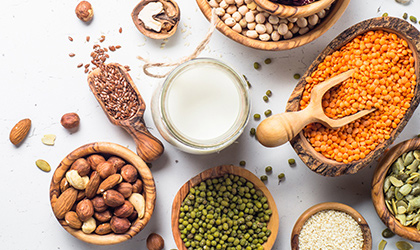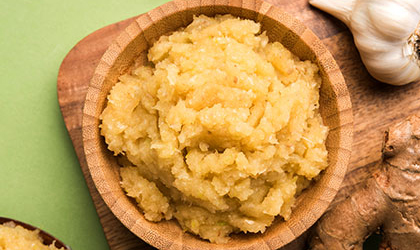
Most of us have experienced that stomach-churning sensation before – be it first-date nerves, examination stress, or simply performing that awkward three-point turn. But full-blown nausea takes this queasy feeling one step further. It’s characterised by that deeply uncomfortable sense you could throw up at any moment. While chronic sickness may indicate something a little more insidious and should be addressed by a medical professional, you can usually relieve a minor digestive upset with the correct nutrition.
How Ginger Supports Your Stomach
Heralded for its anti-nausea credentials, this knobbly root has been used since antiquity to treat a variety of gastrointestinal ailments. But its sickness-soothing powers aren’t just grounded in folklore; countless scientific studies have evaluated ginger as a safe and effective treatment for nausea in many contexts, including that of morning sickness and chemotherapy i. Ginger is known to support digestion. The active compounds found in this pungent spice – gingerols – soothe stomach muscles and ease queasiness. When sickness strikes, there’s no better fix than a good old cup of fresh ginger tea. Peel a thumb size knob of ginger, slice it up, and pop it in a teapot of boiling water. You can even add a dash of honey if you desire. Oh, and don’t forget ginger ale either. This delicious beverage can also work its magic on your upset stomach.
Peppermint to Ease Digestive Distress
Peppermint has long been recognised as a go-to remedy for sickness. Its refreshing, zesty aroma alone may provide some relief for digestive woes. A report published in Pain found that peppermint supported the reduction of gas and indigestion, thanks to its active compounds ii. What’s more, study of 300 individuals experiencing post-operative nausea found their symptoms improved when given aromatherapy with a blend of peppermint oil iii. For the ultimate sickness saviour, pour boiling water over a handful of fresh mint leaves to release its fantastic scent and flavour. Not a tea fan? Chewing on straight-up mint leaves or sugar-free gum may also provide some respite.
Turmeric
Turmeric has been enjoying its moment in the health and wellness world of late – and it’s not surprising. This beautifully golden root doesn’t only offer a slew of health supporting properties, research now proposes it has the power to ease digestive complaints, too. (It really is your one-stop-herb to all-round health, isn’t it?) A bulk of evidence presents the active compound in turmeric, curcumin, as promising support for indigestion iv. To reap the stomach-soothing benefits of turmeric, you need to consume it alongside its culinary chum: healthy fats. We understand, however, that indulging in dairy products and other fat-containing foods is probably the last thing on your mind when you’re feeling queasy. Instead, fix yourself a turmeric tonic, which – as it happens – packs a punch of ginger, too. Heat 1 tbsp. fresh/2 tbsp. ground turmeric, 1 tbsp. fresh/2 tbsp. ground ginger, the juice of 1 lemon, 2 tbsp. maple syrup and 3 cups of water. Bring to a simmer for 3 minutes, strain, et voila – your very own nausea-soothing elixir. Read more about easy way to incorporate turmeric into your diet here.
Apple
In the case of digestive upsets, the adage ‘an apple a day keeps the doctor away’ has never been truer. Apples are chock-full of fibre, which helps your body eliminate toxins much faster. By slowing down digestion, the rough stuff increases the absorption of nutrients, eases the digestive process and may relieve nausea. That being said, there’s also truth in having too much of a good thing – and going overboard on fibrous food could actually exacerbate your nausea. Bottom line: eat one whole apple during bouts of sickness. If that doesn’t seem palatable, go for some natural, sugar-free apple juice or sauce. Discover more ways to up your fibre intake here.
Chicken broth
That hot bowl of chicken soup may soothe winter snuffles, but it’s far too heavy when you’re feeling sick. You see, fats delay emptying the stomach, so they should be avoided when nausea hits. Instead, why not try soothing your symptoms with chicken broth, which is much lower in fat? Added bonus: this meal contains healthy amounts of sodium and, of course, water – both important components if you become dehydrated from vomiting or diarrhoea. Vegetarian? No problemo. Simply whip up a mug of veggie broth from a high quality bouillon cube.
Probiotics
If you’re dealing with tummy trouble, probiotic-rich foods are another powerful weapon in your arsenal. These fellas flood your gut with good bacteria, supporting digestion and nutrient absorption. Probiotics are so dang potent, they are said to relieve a host of stomach stress and constipation v. Embracing fermented foods – sauerkraut, kefir, Greek yoghurt, kimchi, kombucha and miso – is a brilliant place to start because of their exceptionally rich probiotic qualities. Read more about nourishing your gut health here.
BRAT diet
BRAT is the acronym for banana, rice, applesauce and toast – foods that have been championed for soothing sickness. What do all these foods have in common, you ask? Well, they’re famous for being, err, pretty dang bland. Sticking to them after vomiting, diarrhoea and nausea is a helpful way to ease the stomach. The good news is that you don’t just have to stick to bananas, toast and rice; crackers, weak tea, boiled potatoes, porridge and flat soda also earn their stripes as BRAT foods. It’s worth mentioning some culprits you should avoid if you’re feeling queasy, too. Milk, dairy, anything fried, proteins (steak, pork, salmon), raw veggies (carrot sticks, cauliflower, broccoli), some fruits (pineapple, grapefruit, tomatoes), very hot or cold drinks, and anything caffeinated are off the menu – sorry!
Water
Sure – this may be pretty simple, hackneyed advice, but it’s worth heeding when you’re feeling nauseated, especially if vomiting and diarrhoea accompany it. Keeping your fluids topped up will prevent dehydration and those nagging headaches that often strike with sickness. A word of warning, though: guzzling too much may intensify your symptoms. Start by sipping tiny amounts until your stomach can handle a little more.
References:
-
Lete, I. & Allué, B. (2016). The Effectiveness of Ginger in the Prevention of Nausea and Vomiting during Pregnancy and Chemotherapy. Integrative medicine insights, 11, 11-7.
-
Harrington, A., Hughes, P., Martin, C., Yang, J., Castro, J., Isaacs, N., Blackshaw, A., Brierley, S. (2011). A novel role for TRPM8 in visceral afferent function. Pain, 152(7), pp.1459-1468.
-
ScienceDaily. (2018). Two alternative treatments may help relieve postoperative nausea. Available online: https://www.sciencedaily.com/releases/2013/08/130822103525.htm [Accessed 9 Nov. 2018].
-
Dulbecco, P. (2013). Therapeutic potential of curcumin in digestive diseases. World Journal of Gastroenterology, 19(48), 9256.
-
Hemarajata, P. & Versalovic, J. (2013). Effects of probiotics on gut microbiota: mechanisms of intestinal immunomodulation and neuromodulation. Therapeutic advances in gastroenterology, 6(1), 39-51.
You Might Also Like

Keri
Keri Filtness has worked in the Nutrition Industry for 19 years. She is regularly called upon for her professional comments on health and nutrition related news. Her opinions have been featured by BBC3, Prima, Vitality, The Mirror, Woman’s Own and Cycling Weekly, amongst others. She has also worked one to one with journalists, analysing their diets and health concerns and recommending changes and additions, where appropriate.
View More



